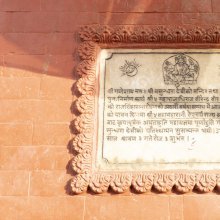Saha, Sāha, Shaha: 25 definitions
Introduction:
Saha means something in Buddhism, Pali, Hinduism, Sanskrit, Marathi, Jainism, Prakrit, Hindi, biology, Tamil. If you want to know the exact meaning, history, etymology or English translation of this term then check out the descriptions on this page. Add your comment or reference to a book if you want to contribute to this summary article.
Alternative spellings of this word include Saah.
Images (photo gallery)
(+31 more images available)
In Hinduism
Purana and Itihasa (epic history)
Source: archive.org: Puranic Encyclopedia1) Saha (सह).—One of the hundred sons of Dhṛtarāṣṭra. He was killed in the great war by Bhīmasena. (Karṇa Parva, Chapter 51, Verse 8).
2) Saha (सह).—A very powerful Agni. (Vana Parva, Chapter 222).
3) Sahā (सहा).—A Celestial woman. She also was with the apsarā women who were present at Indraloka to receive Arjuna. (Mahābhārata, Vana Parva, Chapter 43, Verse 30).
Source: Cologne Digital Sanskrit Dictionaries: The Purana Index1a) Saha (सह).—A son of Prāṇa, and a Vasu.*
- * Bhāgavata-purāṇa VI. 6. 12.
1b) A son of Kṛṣṇa and Mādrī.*
- * Bhāgavata-purāṇa X. 61. 15.
1c) Month (Tamil-Mārgali);1 sacred to Aṃśu.2
- 1) Brahmāṇḍa-purāṇa II. 13. 10; Vāyu-purāṇa 30. 9; 50. 201; 52. 19; 62. 49.
- 2) Bhāgavata-purāṇa XII. 11. 41.
1d) A god of the Ābhūtaraya group.*
- * Brahmāṇḍa-purāṇa II. 36. 56.
1e) One of the ten sons of Svāyambhuva Manu.*
- * Matsya-purāṇa 9. 4.
1f) The last and tenth son of Auttama Manu, generous and much reputed.*
- * Matsya-purāṇa 9. 13.
Saha (सह) is a name mentioned in the Mahābhārata (cf. I.52.5, I.57) and represents one of the many proper names used for people and places. Note: The Mahābhārata (mentioning Saha) is a Sanskrit epic poem consisting of 100,000 ślokas (metrical verses) and is over 2000 years old.
Saha is also mentioned in the Mahābhārata (cf. I.108.2) and represents one of the many proper names used for people and places.

The Purana (पुराण, purāṇas) refers to Sanskrit literature preserving ancient India’s vast cultural history, including historical legends, religious ceremonies, various arts and sciences. The eighteen mahapuranas total over 400,000 shlokas (metrical couplets) and date to at least several centuries BCE.
Ayurveda (science of life)
Nighantu (Synonyms and Characteristics of Drugs and technical terms)
Source: WorldCat: Rāj nighaṇṭuSahā (सहा) is another name for Jīmūtaka, a medicinal plant identified with Luffa echinata (bitter sponge gourd or bitter luffa) from the Cucurbitaceae or “gourd family” of flowering plants, according to verse 3.58-60 of the 13th-century Raj Nighantu or Rājanighaṇṭu. The third chapter (guḍūcyādi-varga) of this book contains climbers and creepers (vīrudh). Together with the names Sahā and Jīmūtaka, there are a total of nineteen Sanskrit synonyms identified for this plant.

Āyurveda (आयुर्वेद, ayurveda) is a branch of Indian science dealing with medicine, herbalism, taxology, anatomy, surgery, alchemy and related topics. Traditional practice of Āyurveda in ancient India dates back to at least the first millenium BC. Literature is commonly written in Sanskrit using various poetic metres.
Shaivism (Shaiva philosophy)
Source: Brill: Śaivism and the Tantric TraditionsSaha (सह) refers to “(those who) endure (extremes)”, according to the Jayadrathayāmala, Ṣaṭka 1 verse 13.3–18::—Accordingly, “[...] [And], O Goddess, [the Śivadharmadīkṣā] has two forms: in Śaiva scriptures the division of initiation is called that without the seed and that with the seed. [...] The sabījā is the opposite to this and is performed, O beautiful one, for those who are learned, endure extremes (dvandva-saha) and are able bodied. By those the rituals towards the Guru, the God and the fire have to be performed with extreme devotion, since the desired fruit will not come about for them who don’t do [these rites]. [...]”.

Shaiva (शैव, śaiva) or Shaivism (śaivism) represents a tradition of Hinduism worshiping Shiva as the supreme being. Closely related to Shaktism, Shaiva literature includes a range of scriptures, including Tantras, while the root of this tradition may be traced back to the ancient Vedas.
In Buddhism
Theravada (major branch of Buddhism)
Source: Journey to Nibbana: Patthana DhamaSaha means ogether, in parallel with, at the same time, coming together.
Source: Buddhist Information: A Survey of Paramattha DhammasSaha means together
Theravāda is a major branch of Buddhism having the the Pali canon (tipitaka) as their canonical literature, which includes the vinaya-pitaka (monastic rules), the sutta-pitaka (Buddhist sermons) and the abhidhamma-pitaka (philosophy and psychology).
Biology (plants and animals)
Source: Google Books: CRC World Dictionary (Regional names)1) Saha in India is the name of a plant defined with Dendranthema indicum in various botanical sources. This page contains potential references in Ayurveda, modern medicine, and other folk traditions or local practices It has the synonym Chrysanthemum sabinii Lindley (among others).
2) Saha is also identified with Pueraria lobata It has the synonym Neustanthus chinensis Benth. (etc.).
3) Saha is also identified with Pueraria montana It has the synonym Dolichos japonicus hort. (etc.).
4) Saha is also identified with Teramnus labialis It has the synonym Glycine abyssinica Hochst. ex A. Rich. (etc.).
5) Saha is also identified with Vigna trilobata It has the synonym Phaseolus trilobatus (L.) Schreber (etc.).
Example references for further research on medicinal uses or toxicity (see latin names for full list):
· J. Korean Res. Inst. Better Living. (1976)
· Flora Boreali-Americana (1803)
· Synopsis Plantarum (Persoon) (1807)
· Journal of Economic and Taxonomic Botany (1987)
· Hooker’s Journal of Botany and Kew Garden Miscellany (1851)
· Journal of Japanese Botany (1937)
If you are looking for specific details regarding Saha, for example health benefits, pregnancy safety, extract dosage, diet and recipes, side effects, chemical composition, have a look at these references.

This sections includes definitions from the five kingdoms of living things: Animals, Plants, Fungi, Protists and Monera. It will include both the official binomial nomenclature (scientific names usually in Latin) as well as regional spellings and variants.
Languages of India and abroad
Pali-English dictionary
Source: BuddhaSasana: Concise Pali-English Dictionarysaha : (conjunctive particle) with; together; accompanied by. (adj.), enduring.
Source: Sutta: The Pali Text Society's Pali-English Dictionary1) Saha, 2 (adj.) (fr. sah) submitting to, enduring M. I, 33; Th. 1, 659; J. VI, 379; sabbasaha J. V, 425, 431.—dussaha hard to endure Sdhp. 95, 118, 196 (Page 701)
2) Saha, 1 (indecl.) (fr. sa3; cp. Vedic saha) prep. & prefix, meaning: in conjunction with, together, accompanied by; immediately after (with Instr.) Vin. I, 38; Sn. 49, 928; Th. 2, 414=425; sahā Sn. 231.
—anukkama=sahānukkama with the bridle Dh. 398; DhA. IV, 161.—āmacca together with the ministers Mhvs 5, 182.—āvudha together with one’s weapons J. IV, 416.—indaka together with Indra D. II, 208, 221; Vv 301.—ūdaka together with water J. V, 407.—oḍha together with the stolen goods; coraṃ °-aṃ gahetvā Vism. 180; Mhvs 23, 11 (thena); 35, 11. See oḍḍha.—odaka containing water Mhvs 4, 13.—orodha with his harem Mhvs 5, 182;—kathin conversing with (Instr.) M. I, 489.—kāra a sort of fragrant mango KhA 53.—gata accompanying, connected with, concomitant Vin. I, 10; D. II, 186; S. V, 421; Kvu 337; DhsA. 157.—ggaṇa together with his companions Dpvs 14, 58.—cetiya containing a Cetiya Mhvs 33, 10.—ja born at the same time Vv 8115.—jāta 1. born at the same time, of equal age J. I, 54; VI, 512.—2. arisen at the same time, coinciding with (Instr.) Kvu 337, 620; VbhA. 127. ‹-› 3. (in °paccaya) the relation of co-nascence, coincidence Dukp 17 sq. , 52 sq. , 113 sq. , 129 sq. , 145 sq. , 225 sq. , 334 sq. and passim; Tikp 36 sq. , 62 sq. , 107 sq. , 243 sq.; Vism. 535. —jīvin (fem.—ī) living together with Vin. IV, 291, 325 sq. —dhammika having the same Dhamma, co-religionist M. I, 64; Nd1 485 (opp. para°); regarding the Dhamma D. I, 94, 161; M. I, 368; Vin. I, 134; Nett 52; DA. I, 263 (=sahetuka, sakāraṇa); that which is in accordance with the dhamma Dhs. 1327; M. I, 482; °ṃ adv. in accordance with the dhamma Vin. I, 60, 69; III, 178; IV, 141. —dhammiya co-religionist Nett 169. —dhenuka accompanied by a cow Mhvs 21, 18. —nandin rejoicing with It. 73. —paṃsukīḷita a companion in play, a playfellow A. II, 186: J. I, 364; IV, 77; PvA. 30. —pesuṇa together with slander Sn. 862 f.; Nd1 257. —bhāvin being at one’s service J. III, 181 (amacca). —bhū arising together with Dhs. 1197; Nett 16; a class of devas D. II, 260. —macchara with envy Sn. 862. —yoga=karaṇa-vacana SnA 44. —vatthu living together with Th. 2, 414= 425; ThA. 269. —vāsa living together, associating Vin. II, 34; It. 68. —vāsin living together J. V, 352. —saṅgha together with the Order Mhvs 1, 71. —seyyā sharing the same couch, living together Vin. IV, 16; KhA 190. —sevaka together with the servants Mhvs 36, 43. —sokin sorrowful (?) S. IV, 180. (Page 700)
— or —
Sāha, six days (cp. chāha) J. VI, 80 (=chadivasa, C.). (Page 707)

Pali is the language of the Tipiṭaka, which is the sacred canon of Theravāda Buddhism and contains much of the Buddha’s speech. Closeley related to Sanskrit, both languages are used interchangeably between religions.
Marathi-English dictionary
Source: DDSA: The Molesworth Marathi and English Dictionaryśaha (शह).—m ( P King.) In chess-playing. Check. Pr. śāhaṇyāsa śaha mūrkhāsa ṭōṇapā. 2 fig. The bearing or set state against (as of an enemy against a person or place): also intent or vigilant state (as of one watching an opportunity). v dē, basa, yē. 3 fig. A notice, warning, or suggestive intimation. v dē. śahāsa guntaṇēṃ To be bound and confined (as by some promise or engagement).
--- OR ---
śahā (शहा).—An interjection used by a person under the afflatus of kānhōbā and other such demons.
--- OR ---
śahā (शहा).—m ( P) A king. Little used but in ex. nēsēna tara śahācēṃ nēsēna nāhīṃ tara nāgavī basēna I'll have royal garments or I'll sit naked.
--- OR ---
śahā (शहा).—m ( H Banker.) In Maraṭhi this word, although sometimes signifying Banker (as in the Pr. śahā kiṃvā pādaśahā First the Banker, then the King), is rather a title or an epithet of Banker (i. e. of sāvakāra) implying Substantial; also reputable or creditable. Applied also to asāmī (Person or individual) in the sense Respectable or trustworthy; also to kūḷa (Tenant, debtor &c.) in the sense Solvent or competent for money-dealings. 2 Applied, as a respectful designation, to the Zakatdar or Custom-farmer (and, by many, to his personal station or office). Hence śahācā dākhalā or śahācī ṭīpa A token of payment given by the Custom-farmer.
--- OR ---
saha (सह).—a S That suffers, endures, or bears. In comp. as dussaha, nissaha, prasaha.
--- OR ---
saha (सह).—S A particle implying I. Association or connection. With, along with, together with. II. Union or junction. III. Increase or addition. IV. Completeness or entireness.
--- OR ---
sahā (सहा).—a (ṣaṣ S) Six.
--- OR ---
sahā (सहा).—f (Better sāya) Cream &c.
--- OR ---
sāhā (साहा).—a (Or sā) Six.
Source: DDSA: The Aryabhusan school dictionary, Marathi-Englishśaha (शह).—m Check. The set state against. A warning.
--- OR ---
śahā (शहा).—m A king.
--- OR ---
saha (सह).—a That suffers, endures.
--- OR ---
saha (सह).—A particle implying Association; union; increase; completeness.
--- OR ---
saha (सह) [- jānasāra, - जानसार].—ad Easily.
--- OR ---
sahā (सहा).—a Six. f Cream.
--- OR ---
sāhā (साहा).—a Six. sāhā mahīnyāñcī jāmbhaī A term for a long-pending litigation or other business.
Marathi is an Indo-European language having over 70 million native speakers people in (predominantly) Maharashtra India. Marathi, like many other Indo-Aryan languages, evolved from early forms of Prakrit, which itself is a subset of Sanskrit, one of the most ancient languages of the world.
Sanskrit dictionary
Source: DDSA: The practical Sanskrit-English dictionarySaha (सह).—a. [sahate sah-ac]
1) Bearing, enduring, suffering.
2) Patient.
3) Able; see असह (asaha); चरतस्तपस्तव वनेषु सहा न वयं निरूपयितुमस्य गतिम् (caratastapastava vaneṣu sahā na vayaṃ nirūpayitumasya gatim) Kirātārjunīya 6.36.
4) Overpowering, vanquishing.
5) Defying, equal to.
6) Exerting.
-haḥ 1 The month मार्गशीर्ष (mārgaśīrṣa).
2) Name of Śiva.
-haḥ, -ham Power, strength.
-ham A kind of salt; L. D. B.
--- OR ---
Saha (सह).—ind.
1) With, together with, along with, accompanied by (with instr.); शशिना सह याति कौमुदी सह मेघेन तडित् प्रलीयते (śaśinā saha yāti kaumudī saha meghena taḍit pralīyate) Kumārasambhava 4.33.
2) Together, simultaneously, at the same time; अस्तोदयौ सहैवासौ कुरुते नृपतिर्द्विषाम् (astodayau sahaivāsau kurute nṛpatirdviṣām) Subhāṣ. (The following senses are given of this word:-sākalya, sādṛśya, yaugapadya, vidyamānatva, samṛddhi, saṃbandha and sāmarthya.)
--- OR ---
Sahā (सहा).—
1) The earth.
2) The aloe-plant of flower.
Source: Cologne Digital Sanskrit Dictionaries: Edgerton Buddhist Hybrid Sanskrit DictionarySahā (सहा).—(also rarely 2 saha, m., q.v.; Sanskrit Lex. earth, but in lit. only [Buddhist Hybrid Sanskrit]), name of the world-system in which we live; almost invariably with lokadhātu, but without it Mahāvastu ii.380.18 (verse) tehi bhaveyā saha (so mss., n. sg., m.c.) saṃprapūrā; Sahā nāmnā lokadhātuḥ Bodhisattvabhūmi 295.5; in the following either [compound] or (oftener) associated with lokadhātu: Mahāvyutpatti 3066; Saddharmapuṇḍarīka 185.3—4 (asyāṃ sahāyāṃ lokadhātau); 317.9 (id.); 244.4 (sahāṃ °tuṃ); Mahāvastu ii.319.12 (verse; sarvāṃ sahāṃ…°tuṃ); Divyāvadāna 293.19 (imāṃ sahā-lokadhātuṃ); (Ārya-)Mañjuśrīmūlakalpa 2.12; 229.25; Gaṇḍavyūha 8.23, etc.; 215.19 (sahāyā °dhātoḥ); Sukhāvatīvyūha 99.16. See Sahā(ṃ)pati.
Source: Cologne Digital Sanskrit Dictionaries: Shabda-Sagara Sanskrit-English DictionarySaha (सह).—mfn.
(-haḥ-hā-haṃ) Patient, enduring, suffering, bearing. m.
(-haḥ) The month Agrahayana. mn.
(-haḥ-haṃ) Strength, power. f.
(-hā) 1. The earth. 2. The Aloe plant. 3. A sort of bean, commonly Mudgaparni. 4. A drug, commonly Nakhi. 5. A plant; also Dandotpala. 6. Barleria, (the white sort.) 7. The ichneumon plant or Rasna. 8. A medicinal sort of moon plant. Ind. 1. With, together with; a particle implying association, connection. 2. Union, junction. 3. Increase, addition. 4. Presence, present time. 5. Completeness, entireness. 6. Resemblance, &c. 7. Simultaneously. E. ṣah to have patience, aff. ac, fem. aff. ṭāp .
--- OR ---
Sahā (सहा).—f.
(-hā) The earth. E. sah to bear, ac aff.
Source: Cologne Digital Sanskrit Dictionaries: Benfey Sanskrit-English DictionarySaha (सह).—[sah + a], I. adj. 1. Bearing, [Bhartṛhari, (ed. Bohlen.)] 2, 68. 2. Suffering. 3. Enduring, [Pañcatantra] iii. [distich] 178 (śīta-vāta -ātapa-, Enduring coldness, wind, and heat). 4. Patient. 5. Able, [Vikramorvaśī, (ed. Bollensen.)] 78, 10; [Śiśupālavadha] 9, 51. Ii. m. and n. Strength, power. Iii. m. The month Mārgaśīr- ṣa (November
— December). Iv. f. hā. 1. The earth. 2. The name of several plants.
--- OR ---
Saha (सह).—i. e. sa + dhā (with h for dh as often, and the final shortened, cf. tra for trā, sadha, ved.), 1. adv. as former part of comp. words, With, united, common, like, complete (e. g. sahakārin). 2. prep. With (with instr., [Rāmāyaṇa] 3, 55, 41; epic also with dat.,
— Cf. probably [Latin] sŏdā + lis.
Source: Cologne Digital Sanskrit Dictionaries: Cappeller Sanskrit-English DictionarySaha (सह).—1. [adverb] together, in common, along with (mostly °— or as [preposition] [with] [instrumental]).
--- OR ---
Saha (सह).—2. [adjective] powerful; overcoming, vanquishing (—°); bearing, withstanding, enduring, a match for ([genetive] or —°); capable of, able to (infin. or —°).
--- OR ---
Sāha (साह).—[adjective] powerful; overwhelming, resisting (—°).
--- OR ---
Sahā (सहा).—arise, stand up.
Sahā is a Sanskrit compound consisting of the terms sa and hā (हा).
--- OR ---
Sahā (सहा).—leave (together); give up, resign. — Cf. apahāya, nihīna ([additions]), parihīṇa, prahīṇa, vihāya, vihīna, hitvā/.
Sahā is a Sanskrit compound consisting of the terms sa and hā (हा).
Source: Cologne Digital Sanskrit Dictionaries: Monier-Williams Sanskrit-English Dictionary1) Śāha (शाह):—m. = شاه (See nema-, phatiha-, bhūmi-ś)
2) Name of a country belonging to Kaśmīra, [Rājataraṅgiṇī]
3) Saha (सह):—[from sah] 1. saha mf(ā)n. powerful, mighty, [Ṛg-veda]
4) [v.s. ...] (ifc.) overcoming, vanquishing, [Mahābhārata]
5) [v.s. ...] bearing, enduring, withstanding, defying, equal to, a match for ([genitive case] or [compound]), [Mahābhārata; Kāvya literature] etc.
6) [v.s. ...] causing, effecting, stimulating, exerting, [Śiśupāla-vadha]
7) [v.s. ...] able to, capable of ([infinitive mood] cr [compound]), [Kālidāsa; Śiśupāla-vadha; Kathāsaritsāgara]
8) [v.s. ...] m. the month Mārgaśīrṣa (See sahas), [Vājasaneyi-saṃhitā; Śatapatha-brāhmaṇa; Caraka]
9) [v.s. ...] a [particular] Agni, [Mahābhārata]
10) [v.s. ...] a species of plant, [Atharva-veda]
11) [v.s. ...] Name of a son of Manu, [Harivaṃśa]
12) [v.s. ...] of a son of Prāṇa and Ūrjasvatī, [Bhāgavata-purāṇa]
13) [v.s. ...] of a son of Dhṛtarāṣṭra, [Mahābhārata]
14) [v.s. ...] of a son of Kṛṣṇa and Mādrī, [Bhāgavata-purāṇa]
15) Sahā (सहा):—[from saha > sah] a f. the earth, [cf. Lexicographers, esp. such as amarasiṃha, halāyudha, hemacandra, etc.]
16) [v.s. ...] (with Buddhists) Name of a division of the world (with loka-dhātu, ‘the world inhabited by men’), [Kāraṇḍa-vyūha]
17) [v.s. ...] Name of various plants ([according to] to [cf. Lexicographers, esp. such as amarasiṃha, halāyudha, hemacandra, etc.] = Aloe Perfoliata, daṇḍopatā, rāsnā etc.), [Varāha-mihira’s Bṛhat-saṃhitā; Suśruta]
18) [v.s. ...] Unguis Odoratus, [cf. Lexicographers, esp. such as amarasiṃha, halāyudha, hemacandra, etc.]
19) Saha (सह):—[from sah] n. = bala, [cf. Lexicographers, esp. such as amarasiṃha, halāyudha, hemacandra, etc.]
20) [v.s. ...] kind of salt, [cf. Lexicographers, esp. such as amarasiṃha, halāyudha, hemacandra, etc. 1.]
21) Sahā (सहा):—[from sah] b See under 1. saha, [column]1.
22) Saha (सह):—2. saha ind. ([probably] [from] 7. sa+dhā, which in Veda may become dha; cf. 1. sadha) together with, along with, with (with √grah and ā-√dā, ‘to take with one’; with √dā, ‘to give to take away with one’; with kṛtvā and [accusative], ‘taking with one’, ‘in the company of’; often as a [preposition] governing [instrumental case] case, but generally placed after the governed word e.g. tena saha, ‘along with him’ ; exceptionally with [ablative] e.g. aiśvaryāt saha, ‘with sovereignty’ [Cāṇakya 104])
23) in common, in company, jointly, conjointly, in concert (often used as a prefix in [compound], expressing ‘community of action’, e.g. sahādhyayana q.v.; or forming adjectives expressing ‘the companion of an action’, e.g. saha-cara q.v.)
24) at the same time or simultaneously with (prefixed to adverbs of time e.g. saha-pūrvāhṇam q.v.; rarely ifc. e.g. vainateya-s, ‘with Vainateya’ [Harivaṃśa]), [Ṛg-veda] etc. etc.
25) m. a companion, [cf. Lexicographers, esp. such as amarasiṃha, halāyudha, hemacandra, etc.]
26) Sahā (सहा):—[from saha] c f. a female companion, [Bhāgavata-purāṇa]
27) Sāha (साह):—[from sāh] 1. sāha mfn. ([from] √sah) powerful, mighty, [Ṛg-veda]
28) [v.s. ...] (also ṣāha ifc.) resisting, conquering, subduing, [Mahābhārata]
29) 2. sāha m. = شاه (See pradīpaand madhukara-s).
Source: Cologne Digital Sanskrit Dictionaries: Yates Sanskrit-English Dictionary1) Ṣaha (षह):—sahate 1. d. Also (ya, ki,) sahyati, sahati, sāhayati. To bear, to suffer; to be content; to be able. With ut, to make an effort; to be happy; with pra, to be violent; with vi, to determine.
2) Saha (सह):—[(haḥ-hā-haṃ) m.] The month Agrahāyana. m. n. Strength. 1. f. The earth; aloe plant; name of a number of plants. a. Patient, bearing. Ind. With.
Source: DDSA: Paia-sadda-mahannavo; a comprehensive Prakrit Hindi dictionary (S)Saha (सह) in the Sanskrit language is related to the Prakrit words: Saha, Sahu.
[Sanskrit to German]
Sanskrit, also spelled संस्कृतम् (saṃskṛtam), is an ancient language of India commonly seen as the grandmother of the Indo-European language family (even English!). Closely allied with Prakrit and Pali, Sanskrit is more exhaustive in both grammar and terms and has the most extensive collection of literature in the world, greatly surpassing its sister-languages Greek and Latin.
Hindi dictionary
Source: DDSA: A practical Hindi-English dictionary1) Śaha (शह) [Also spelled shah]:——an allomorph of [śāha] (nf) instigation, incitement; a check (in chess); ~[jādā] a prince; ~[jādī] a princess; ~[jora] powerful; strong; ~[jorī] powerfulness, strength; ~[tūta] the mulberry tree and its fruit; caneapple; ~[bālā] the younger boy (esp. brother) who accompanies the bridegroom in various wedding functions; ~[māta] the conclusive check (in chess); •[karanā] to render helpless; ~[savāra] an adept horseman/rider; ~[savārī] horsemanship; —[denā] to incite; to apply a check.
2) Śāha (शाह) [Also spelled shah]:—(nm) a king; the king in playing cards or in chess; master; title of Mohammedan fakirs; -[e-vakta] the contemporary ruler; ~[kāra] a masterpiece; ~[kharca] a spendthrift, extravagant; ~[kharcī] extravagance, spending with an open hand; ~[jādā] a prince; ~[jādī] a princess; -[jī] a title of Mohammedan fakirs; now a common mode of address in north India, more particularly amongst the Panjabis; ~[balūta] the oak (tree); ~[bālā] see [śaha] ~([bālā]); ~[rāha] a highway; ~[savāra] see [śaha] (~[savāra]).
3) Saha (सह) [Also spelled sah]:—(ind) with, along with, simultaneously; co-; (a) enduring. bearing; proof (as [jalasaha] waterproof); -[aparādhitā] complicity; -[aparādhī] an accomplice; -[abhiyukta] co-accused; -[astitva] co-existence; ~[karttā] a colleague; collaborator; ~[kāra] cooperation, cooperative enterprise; collaboration; ~[kāritā] cooperation; collaboration; •[āṃdolana] cooperative movement; ~[kārī] cooperative; collaborative; a colleague, junior colleague; assistant; •[samāja] cooperative society; ~[kriyā] synergy; ~[kriyātmaka] synergic; ~[gamana] self-immolation of a widow with her deceased husband; hence ~[gāminī]; (nf); ~[cara] an associate; a companion, friend; a co-variant; hence ~[carī] (feminine form of [sahacara); ~cārī] an associate, a companion, friend; associate element; gregarious, going together; ~[janmā] a twin brother; ~[jāta] congenital; twins; innate, natural; ~[jīvana] symbiosis; co-existence; ~[jivitā] symbiosis; co-existence; ~[jīvī] co-existent; symbiotic; ~[dharma] common duty/law/religion; ~[dharmiṇī] one’s wife; ~[dharmī] co-religionist; charged with the same duties; ~[nartana/nṛtya] dancing together, collective dancing; enclosure; ~[pāṭhī] a class fellow, classmate; ~[bhāgitā] partnership; complicity; ~[bhāgī] a partner; an accomplice; existing together; coexistence; ~[bhoja] collective feasting/eating; ~[bhojī] a mess-mate; ~[maraṇa] see ~[gamana; ~yātrī] a co-traveller, fellow passenger; companion; ~[rājya] condominium; associate state; ~[rāṣṭrika] co-national; ~[lekhaka] co author; collaborator; hence ~[lekhakatva] (nm); ~[lekhana] co-authorship; collaboration; ~[vartitā] concomitance, concurrence; ~[vartī] concomitant, concurrent; ~[śikṣā] co-education; ~[śikṣātmaka/śaikṣika] co-educational; -[saṃpādaka] co-editor; ~[saṃbaṃdha] correlation; ~[svara] harmonious; ~[svaratā] harmony.
4) Sāha (साह) [Also spelled saah]:—(nm) a good man or gentleman (as opposed to a thief —[cora] a trader, merchant; —[jī] a form of address esp. prevalent amongst the Panjabi:-speaking people.
...
Prakrit-English dictionary
Source: DDSA: Paia-sadda-mahannavo; a comprehensive Prakrit Hindi dictionary1) Saha (सह) in the Prakrit language is related to the Sanskrit word: Rāj.
2) Saha (सह) also relates to the Sanskrit word: Sah.
3) Saha (सह) also relates to the Sanskrit word: Ājñā.
4) Saha (सह) also relates to the Sanskrit word: Svaka.
5) Saha (सह) also relates to the Sanskrit word: Saha.
6) Sahā (सहा) also relates to the Sanskrit word: Sabhā.
7) Sāha (साह) also relates to the Sanskrit words: Katha, Śās.
8) Sāha (साह) also relates to the Sanskrit word: Sādh.
9) Sāhā (साहा) also relates to the Sanskrit word: Ślāghā.
10) Sāhā (साहा) also relates to the Sanskrit word: Svāhā.
11) Sāhā (साहा) also relates to the Sanskrit word: Śākhā.
Prakrit is an ancient language closely associated with both Pali and Sanskrit. Jain literature is often composed in this language or sub-dialects, such as the Agamas and their commentaries which are written in Ardhamagadhi and Maharashtri Prakrit. The earliest extant texts can be dated to as early as the 4th century BCE although core portions might be older.
Kannada-English dictionary
Source: Alar: Kannada-English corpusŚaha (ಶಹ):—
1) [noun] a ckecking of the opponent’s king, in the game of chess.
2) [noun] (fig.) complete defeat, frustration.
3) [noun] a king; a sovereign.
--- OR ---
Śahā (ಶಹಾ):—
1) [noun] = ಶಹ [shaha]2) [noun] ಶಹಾ ಕೊಡು [shaha kodu] śahākoḍu to check; to restrain or control; 2. to rebuff, repulse or rebuke.
--- OR ---
Ṣaha (ಷಹ):—
1) [noun] a ckecking of the opponenṭs king, in the game of chess.
2) [noun] (fig.) complete defeat, frustration.
3) [noun] a king; a sovereign.
--- OR ---
Ṣahā (ಷಹಾ):—[noun] = ಷಹ [shaha].
--- OR ---
Saha (ಸಹ):—
1) [noun] the act and power of enduring; endurance.
2) [noun] physical or mental strength.
3) [noun] the ninth month in the Hindu lunar calendar (November-December).
--- OR ---
Saha (ಸಹ):—
1) [adverb] together with; along with.
2) [adverb] in addition; too; besides.
3) [adverb] despite that; in spite of.
--- OR ---
Sahā (ಸಹಾ):—[adverb] in addition; too; besides; also.
--- OR ---
Sahā (ಸಹಾ):—[noun] = ಸಹೆ [sahe].
Kannada is a Dravidian language (as opposed to the Indo-European language family) mainly spoken in the southwestern region of India.
Tamil dictionary
Source: DDSA: University of Madras: Tamil LexiconṢaha (ஷஹ) noun < Persn. shahr. A term denoting 'check to the king', in the game of chess; சதுரங்க விளையாட்டில் அரசைத் தடுத்தற்குறி யாகச் சொல்லப்படும் ஒரு குறியீட்டுச்சொல். [sathuranga vilaiyattil arasaith thadutharkuri yagas sollappadum oru kuriyittuchol.]
--- OR ---
Saha (ஸஹ) particle < saha. With, together; கூட. [kuda.]
Tamil is an ancient language of India from the Dravidian family spoken by roughly 250 million people mainly in southern India and Sri Lanka.
See also (Relevant definitions)
Starts with (+1152): Saahas-dekhounu, Saahasik-paryaton, Saahav, Saha Land, Saha Mahinyaci Jambhai, Saha world, Saha-besaha, Saha-gbe-fe, Saha-saciva, Saha-tah, Sahaa, Sahaastitva, Sahab, Sahaba, Sahabalve, Sahabandhava, Sahabasa, Sahabhabin, Sahabhagi, Sahabhagi-samvedana.
Ends with (+209): Abhimatishaha, Abhishaha, Abhyutsaha, Adhikatarussaha, Adhisaha, Adhvasaha, Advadashaha, Agnisaha, Akalasaha, Akhuvishaha, Amitrasaha, Anadhisaha, Anirdashaha, Antardashaha, Anutsaha, Apataduhsaha, Apatadushprasaha, Aprasaha, Ardhasaha, Arthavyayasaha.
Full-text (+1337): Sahas, Sahampati, Sahapati, Sahasa, Sahokti, Susaha, Sahamarana, Sahacarin, Sahi, Bharasaha, Duhsaha, Amitrasaha, Sahasa-dilaunu, Shatrusaha, Devasaha, Sahapana, Yajnasaha, Shahajirem, Shahajada, Sahacarita.
Relevant text
Search found 200 books and stories containing Saha, Sa-ha, Sa-hā, Saaha, Sāha, Śaha, Śahā, Sahā, Sāhā, Śāha, Ṣaha, Ṣahā, Shaha; (plurals include: Sahas, has, hās, Saahas, Sāhas, Śahas, Śahās, Sahās, Sāhās, Śāhas, Ṣahas, Ṣahās, Shahas). You can also click to the full overview containing English textual excerpts. Below are direct links for the most relevant articles:
Rig Veda (translation and commentary) (by H. H. Wilson)
Maha Prajnaparamita Sastra (by Gelongma Karma Migme Chödrön)
Act 9.5: Samantaraśmi offers to pay homage to Buddha Śākyamuni < [Chapter XV - The Arrival of the Bodhisattvas of the Ten Directions]
Act 9.6: Ratnākara approves of Samantaraśmi’s venture to the Sahā universe < [Chapter XV - The Arrival of the Bodhisattvas of the Ten Directions]
Part 5 - Casting the mount sumerus far away < [Chapter XLIX - The Four Conditions]
Chaitanya Bhagavata (by Bhumipati Dāsa)
Verse 3.4.67 < [Chapter 4 - Descriptions of Śrī Acyutānanda’s Pastimes and the Worship of Śrī Mādhavendra]
Verse 3.5.459 < [Chapter 5 - The Pastimes of Nityānanda]
Verse 3.2.153 < [Chapter 2 - Description of the Lord’s Travel Through Bhuvaneśvara and Other Placesto Jagannātha Purī]
Vimalakīrti Sutra (by John R. McRae)
Chapter X - The Buddha Accumulation Of Fragrances < [Fascicle Three]
Chapter XII - Vision of Akṣobhya Buddha < [Fascicle Three]
Formal Education System in Ancient India (by Sushmita Nath)
The Upanayana Saṃskāra (Introduction) < [Chapter 2 - Rituals of the Education System]
The Pariṣad centre of learning < [Chapter 3 - Centres of Learning in Vedic and Buddhist Period]
The Gurukula centre of learning < [Chapter 3 - Centres of Learning in Vedic and Buddhist Period]





